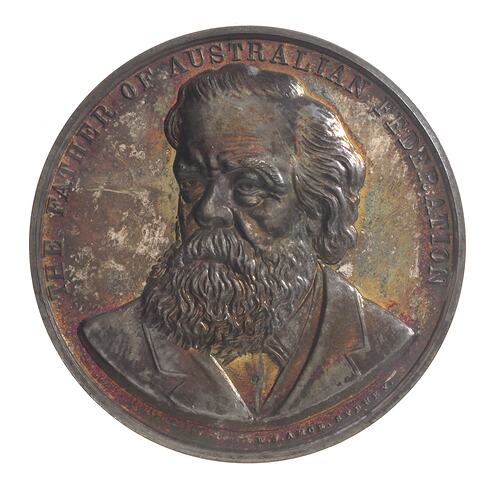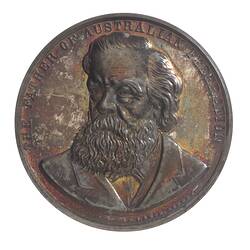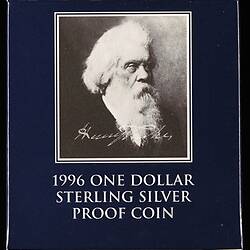Henry Parkes is perhaps the most significant figure in ninteenth century Australian politics, and is known as the 'Father of Federation'.
Parkes was born on 27 May 1815 in Warwickshire, England. The family was forced off the farm by debt when Parkes was eight years old, and his father took work in Birmingham as a gardener and odd-job man. Parkes briefly attended a local parish school in Warwickshire, and later joined the Birmingham Mechanics Institute. He helped the family by working as a road labourer and brickie before being apprenticed to a bone and ivory turner. At 17 he joined Thomas Attwood's Political Union, and four years later he married Clarinda Varney. At 22 he was ready to set up his own business. The business failed within a year, and Henry and Clarinda moved to London. After pawning his tools to enable them to survive they applied to migrate to New South Wales as bounty immigrants.
The Parkes family arrived in Australia in 1839. Parkes found work as a labourer, then worked in an ironmongery and brass foundry. In 1840 he became a tide-waiter with the Customs Department, and the steady income enabled him to buy tools of trade again. In 1840 he set up business in Hunter Street, Sydney, as a ivory turner and importer of fancy goods. He optimistically opened branches in Geelong and Maitland, but both failed, and by 1850 he was again facing financial difficulties, this time with a growing family to support. He was, however, showing considerable talent as a writer and organiser, had become involved in literary and political activities. He set up the radical, liberal newspaper The Empire, and soon gave up working as a shop keeper in favour of being a full time journalist and politician. He strongly supported universal suffrage and land reform, and argued for the cessation of transportation.
After assisting in political campaigns including that of John Dunmore Lang in 1850, Parkes was elected to the New South Wales Legislative Council in 1854. He moved to the Legislative Assembly in 1856. In 1866 Parkes became a Minister in the government of James Martin, and became Premier of New South Wales in 1872 for the first time. His political career included five periods as Premier of New South Wales, despite interruptions through insolvency.
Parkes expressed interest in Australian federation as early as 1867 - 'these colonies should be united by some federal bond of connection' - and reiterated his position in speeches at the 1880-1881 inter-colonial conference.
On 24 October 1889 Parkes addressed a group in Tenterfield calling for 'a great national government for all Australians.a convention of leading men from all the colonies, delegates appointed by the authority of Parliament, who would fully represent the opinions of different Parliaments of the colonies.' Parkes pursued his dream passionately, resulting in the inter-colonial conference in Melbourne in 1890. In 1891, considering issues such as tariffs, trade and defence, Parkes introduced the first conciliation and arbitration legislation in the Australian colonies, and presided over the first Federal convention held in Sydney. The draft constitution of this convention provided the basis for the next 10 years of discussion and negotiation between the colonies. Ill health forced him to retire from proceedings but Sir Samuel Griffith took his place representing Queensland, with Edmund Barton (NSW), Andrew Inglis Clark (Tas.), Charles Cameron Kingston (S.A.), all contributing to the constitution.
Parkes died on 27 April 1896, four years before Australia became a Federation, having established the political directions for the new country. He was survived by his third wife and 11 of his 17 children.
References:
National Library of Australia website http://www.nla.gov.au/guides/federation/people/parkes.html
Australian Dictionary of Biography
More Information
-
Keywords
-
Localities
-
Authors
-
Article types


